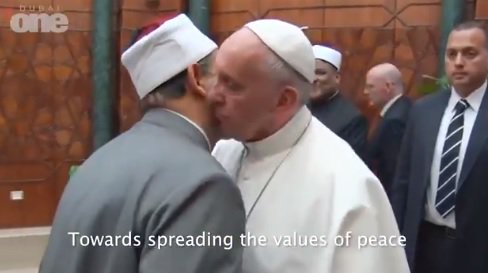Fatima Perspectives #1274
Pope Francis did not invent the epochal folly of “interreligious dialogue,” which requires the Catholic “dialogue partner” to pretend — forever — that God Incarnate did not found the Church he represents and endow it with a divine mission to “teach all nations; baptizing them in the name of the Father, and of the Son, and of the Holy Ghost. Teaching them to observe all things whatsoever I have commanded …” (Matt. 28:19-20)
No, the dissolvent nonsense that is “interreligious dialogue” emerged from the Vatican II document Nostra Aetate, which declares — for the first time in Church history — that “The Church, therefore, exhorts her sons, that through dialogue and collaboration with the followers of other religions, carried out with prudence and love and in witness to the Christian faith and life, they recognize, preserve and promote the good things, spiritual and moral, as well as the socio-cultural values found among these men.”
Quite predictably, the “witness to the Christian faith and life” fig leaf in this pronouncement was quickly dropped in the post-conciliar rush to put “interreligious dialogue” into practice as simply naked religious indifferentism. The results were disastrous.
It was not long before Catholic churchmen succumbed to the utopian delusion of which Pius XI warned when he condemned the nascent “ecumenical movement” of Protestant origin in Mortalium Animos and forbade any Catholic participation in such programs, as though “the nations, although they differ among themselves in certain religious matters, will without much difficulty come to agree as brethren in professing certain doctrines, which form as it were a common basis of the spiritual life.” This fantasy is the mainspring of “interreligious dialogue,” whose very purpose is to advance what Pius XI denounced as “that false opinion which considers all religions to be more or less good and praiseworthy since they all in different ways manifest and signify that sense which is inborn in us all, and by which we are led to God and to the obedient acknowledgment of His rule.”
Those who embrace this false opinion, Pius warned, end in “distorting the idea of true religion” and “little by little, turn aside to naturalism and atheism… altogether abandoning the divinely revealed religion.” This is not to say that the Catholic partisans of this error formally abandon the divinely revealed religion. On the contrary, they continue to identify themselves as Catholics. The abandonment is material in that they no longer speak and act as if the divinely revealed Catholic religion — the “one true religion,” as Catholic churchmen called it during all the centuries before Nostra Aetate — were anything more than just one of the many religions pleasing to God in a world of splendid diversity.
Francis, in fact, expressed precisely that sentiment in a document he signed during his trip to the United Arab Emirates, the Muslim nation-state founded in the very place where Mohammed invented his religion of conquest: “The pluralism and the diversity of religions, colour, sex, race and language are willed by God in His wisdom, through which He created human beings. This divine wisdom is the source from which the right to freedom of belief and the freedom to be different derives.”
There is no distinction here between the positive divine will, which wills only what is good and true, and God’s permissive will, which tolerates evils worked by fallen men rather than preventing their freely willed human actions. As the Catholic Encyclopedia explains, “The council of Trent (Sess. VI, can. vi, A.D. 816) defines that evil is in the power of man, and that evil deeds are not to be attributed to God in the same sense as good deeds, but permissive only [emphasis in original], so that the vocation of Paul is God’s work in a much truer sense than the treachery of Judas.”
No reasonable interpretation of the declaration to which Francis has lent the authority of his office can produce anything other than the conclusion that he has endorsed the error that “all religions [are] more or less good and praiseworthy…” — including Islam, which Pius XI described as “darkness” along with outright idolatry. Francis has declared that God in His wisdom has willed “the diversity of religions,” not merely permitted it, despite the reality that the religions invented by men, including Islam, contradict His revelation on innumerable points and teach damnable errors on matters of faith and morals essential to the salvation of souls.
As we see with Francis, the folly of “interreligious dialogue” requires its Catholic practitioners to embrace the unembraceable, just as Francis embraced the co-signatory of his religiously indifferent declaration in the UAE: none other than “The Grand Imam of Al-Azhar [the world’s foremost institute of Islamic studies]” Ahmed Al-Tayyeb, who is on record as having affirmed the unanimous opinion of Islamic jurists that apostasy from Islam is a crime meriting the death penalty in cases where the apostate threatens Muslim social order. And so it is in the UAE, according to Articles 1 and 66 of its Penal Code, which Francis did not seem to notice in his unstinting praise for the UAE and his absurd veneration of the tomb of its founder while standing alongside Al-Tayyeb.
Indeed, Francis embraced the “Grand Imam” precisely because the religion Al-Tayyeb represents is false. “Interreligious dialogue” is a programmatic embrace of the unembraceable, including the veritable anti-Christianity that Muhammed invented. It is an insult to Christ and the Church He founded, in which now even the Vicar of Christ participates, and the greatest perversity amidst a swarm of perversities that constitute the current crisis in the Church.
Want to read more?
Latest Fatima Perspectives
Fatima Perspectives Archive




